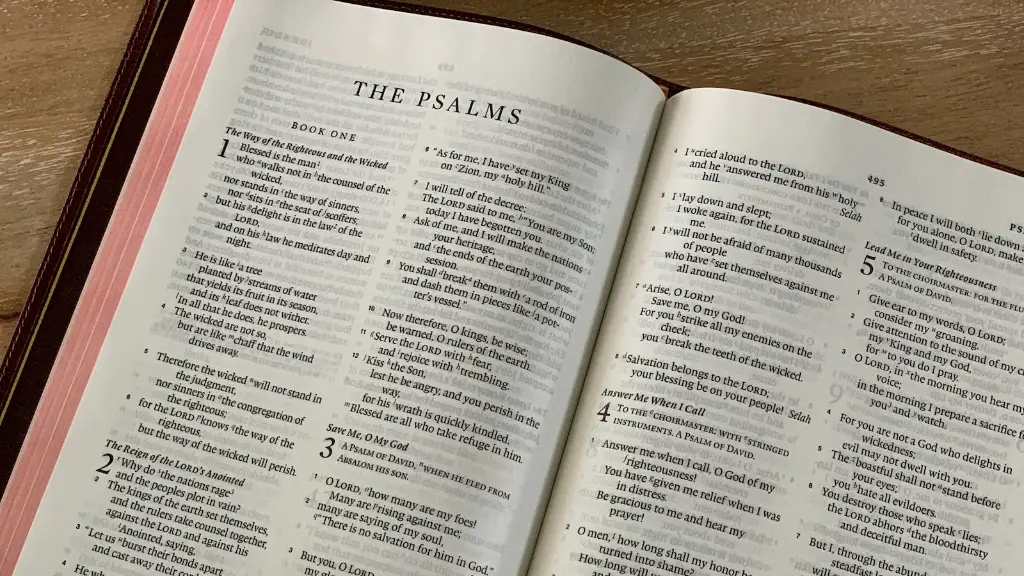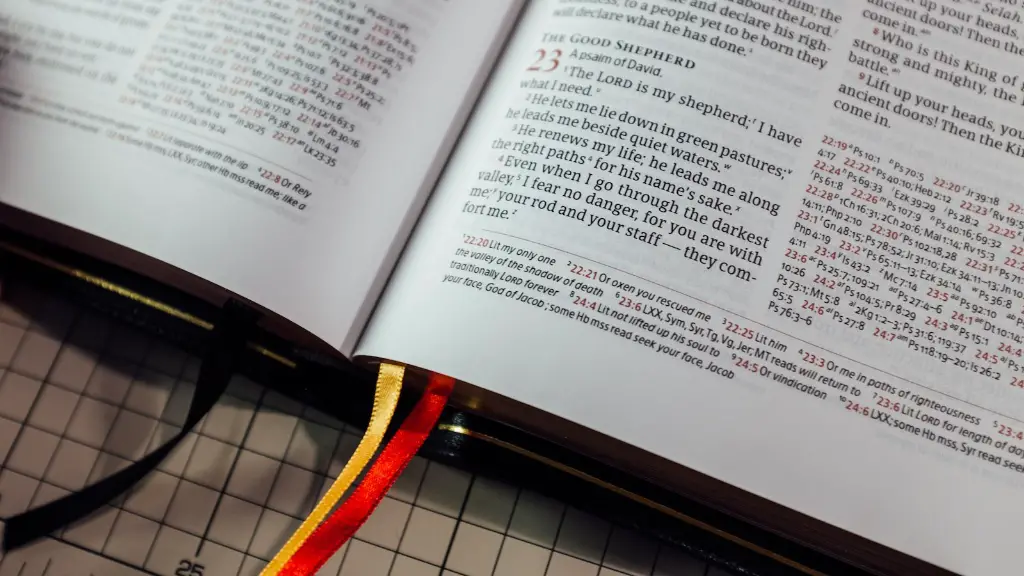The word decree appears many times throughout the Bible. Depending on the Bible translation and context, it can be translated as command, word, word of the LORD, judgement, sentence, promise, or even edict. Understanding the meaning of this word in the context of the Bible is important for gaining a fuller understanding of God’s plan for salvation.
Often when the word decree appears in the Bible, it is linked with a proposal or promise made by God. Many times, God decrees a course of action or decree that will come to fruition in due time. For example, in Genesis 1:14-15, God makes a decree concerning the sun, moon and stars: “Let the lights in the sky be for signs and seasons, and let them serve as lights in the expanse of the heavens to give light on the earth.” This is a clear example of a decree by God that sets the pattern for the world’s natural rhythms.
In some cases, the word is used to describe a judgement or sentence handed down by God. In the Old Testament, prophets would often speak of God’s judgement in the form of a decree. In Jeremiah 28:1-2, the prophet Jeremiah speaks of the Judgement of God: “I, the Lord, make a decree that all the nations of the earth shall be subject to this judgement—that all should go into captivity, into Babylon.” Here, God is using the word “decree” to describe his Judgement upon the nations.
Finally, some Bible translations use the word decree to describe a promise or commandment made by God. All throughout the Bible, God reveals his will and plan for His people in the form of a decree. In Isaiah 55:6-7, God commands: “Seek the Lord while he may be found; call upon him while he is near; let the wicked forsake his way, and the unrighteous man his thoughts; let him return to the Lord, and he will have mercy on him; and to our God, for he will abundantly pardon.” This is a clear example of a commandment from God that is revealed in the form of a decree.
The Context and Meaning of Decree in the Bible
In order to gain a better understanding of the meaning of the word decree in the Bible, it is important to consider the context in which it appears. Invariably, the word appears in a setting which speaks to a declaration, judgement, promise, or command from God. Thus, when we read the word decree in the Bible, we ought to understand it as being a clear declaration of what God intends to do or what He desires His people to do.
At its core, any time the word decree appears, it should be seen as an act of God’s sovereignty. Regardless of the context, it ultimately suggests that God is in control and that all things are in accordance with His will or plan. As Christians, our hope lies in the fact that God, who is a merciful and good God, cares enough to declare His will to us and give us the assurance of His presence in our lives.
Postive and Negative Decrees in the Bible
There are both positive and negative decrees to be found in the Bible. Positive decrees serve to inform the believer of God’s loving provisions and plans, while negative decrees warn of judgement and consequences if certain wrongs are not righted. Whether positive or negative, all of God’s decrees have the same ultimate purpose: to bring glory to God and to help guide and protect His people.
Positive decrees give us hope and motivation to keep following the will and plan of God in our day-to-day lives. The book of Isaiah, for example, speaks of the bold promises and hope of God for the nation of Israel. These promises were made through decrees and gave the nation hope in their darkest moments. Similarly, in the New Testament, Jesus makes many decrees that convey His love and mercy to the people. Both in the Old and New Testaments, God offers hope and comfort through his decrees.
Negative decrees also occur in the Bible. Often times, these are used to warn of the judgement that awaits those who do not turn away from their sins. The book of Revelation, for example, contains many warnings in the form of decrees that threaten judgement upon those who refuse to accept Jesus into their lives. These decrees remind us of the consequences of our actions, while also inspiring us to turn away from our sin and come to the throne of God’s grace.
The Purpose of Decrees in the Bible
Ultimately, the purpose of decrees in the Bible is to remind us of both the promises and judgement of God. As believers, we should be ever mindful of both the positive and negative decrees that God has made in the Bible. We can take comfort in the positive decrees, which give us hope and assurance in our Christian journey, while also being mindful of the negative decrees, which warn of judgement and consequences if we do not turn away from our sins.
Moreover, understanding the meaning of the word decree in the context of the Bible helps us to gain a fuller understanding of God’s plan for salvation. As we come to recognize the power and authority of God through His decrees, we can be assured in knowing that He is in control and that He is always with us as we walk our own path of faith.
Sources Of Decrees In The Bible
The Bible contains numerous sources of decrees, all of which provide insight into the will and plan of God. The Psalms provide great comfort in the form of decrees that remind us of His love and mercy. Likewise, in the New Testament, the Gospels contain words of instruction and warning spoken by Jesus himself. Both Old and New Testament prophets also provide authoritative decrees that convey God’s judgement and promise.
It is important then, for believers to recognize the sources of decrees in the Bible, as these provide us with a greater understanding of the character of God and the promises He has for us. Moreover, understanding the meaning of the word decree in the context of the Bible helps us to appreciate the power and sovereignty of God and to better understand His will for our lives.
Theological View Of Decrees In The Bible
From a theological perspective, there are two primary views regarding the decrees of God in the Bible. The first view is that God’s decrees are immutable, meaning that they cannot be changed or altered in any way. This view holds that God is sovereign and that all of His decrees are binding and unchangeable. The second view is that God’s decrees are not immutable, and that they can be altered or amended depending on the circumstances. This view holds that while God remains sovereign and in control, He has given us free will and the ability to choose our own paths.
In any case, whatever one’s view is regarding the divinity of God’s decrees, it is important for believers to recognize the power and authority of God’s decrees in the Bible. All of God’s decrees exist to bring glory to Him and to provide guidance and assurance to His people.
Living In Accordance With God’s Decrees
As Christians, we must strive to live our lives in accordance with the decrees of God in the Bible. We must be ever mindful of the promises of God as well as His judgement, and strive to live lives that honor Him. We must take comfort in the positive decrees that He has made for us, and remain humble before Him in light of the negative decrees.
Moreover, we must remember the purpose of God’s decrees in the Bible. They exist to remind us of our place and purpose in God’s plan, and to motivate us to pursue our faith journey with zeal. As we come to understand God’s will for our lives by understanding the meaning of decree in the Bible, we can take assurance in knowing that God is in control and that He will ensure us success if we remain faithful.




